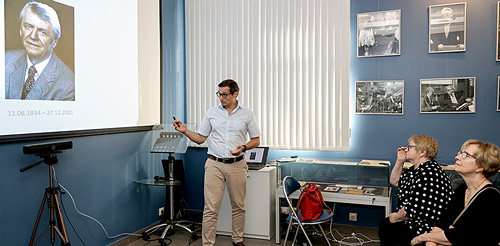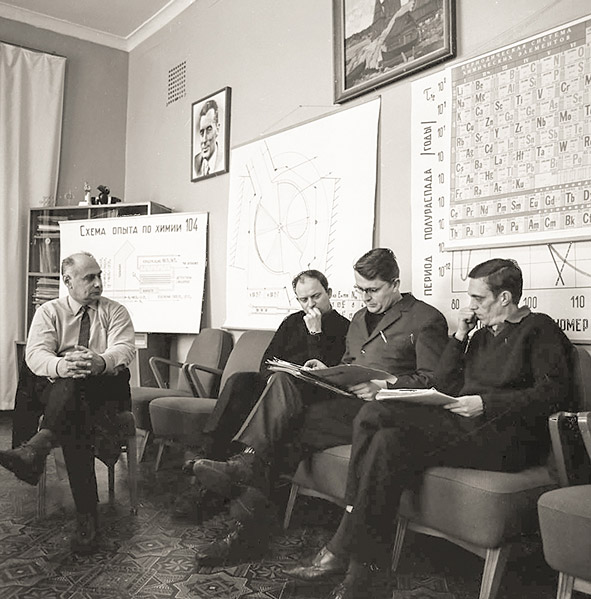
Electronic english version since 2022 |
The newspaper was founded in November 1957
| |
From the Pleiades of pioneers
Remembering Professor Ivo Zvara
A historical and memorial seminar was held at the Museum of History of Science and Technology of JINR dedicated to the 90th anniversary of the birth of the world-famous scientist in the field of chemical identification and research of the properties of transuranium elements, Doctor of Chemical Sciences, Corresponding Member of the Czechoslovak Academy of Sciences, Lenin Prize winner Professor Ivo Zvara (11.06.1934 - 27.12.2021). Colleagues, relatives and close frineds of the scientist gathered.

A report on the scientific contribution of Ivo Zvara was given by Head of the Sector of the Laboratory of Nuclear Reactions Nikolay Aksenov (in the photo). The report also included messages and reports sent especially for this seminar by Ivo Zvara's students - Doctors of Chemical Sciences B.L.Zhuykov (INR RAS, Troitsk) and A.B.Yakushev (GSI, Darmstadt, Germany). The report covers the basic stages of the scientist's scientific biography.
Ivo Zvara is the first Czechoslovak radiochemist to graduate from the Chemistry Department of Moscow State University. In 1960, he began working in Dubna under the supervision of Academician G.N.Flerov, when the laboratory was just starting its work. The profound knowledge obtained at the Department of Radiochemistry of Moscow State University under the supervision of Head of the Department, Corresponding Member A.N.Nesmeyanov and his broad scientific outlook soon brought the young scientist to the forefront of the "battle for the elements". To identify the new 104th element, Ivo Zvara proposed a technique uniting the principles of hot atom chemistry and gas adsorption chromatography. He immediately joined the research implemented at the Laboratory of Nuclear Reactions on the synthesis and research of the properties of elements 104 and 105 (at present, rutherfordium (Rf) and dubnium (Db)), new chemical elements of the Periodic Table of D.I.Mendeleyev at the new U-300 heavy ion accelerator. The brilliant results obtained allowed him to defend his doctoral thesis in chemistry in 1966. In 1967, Ivo Zvara, together with G.N.Flerov, V.A.Druin and S.M.Polikanov (all from FLNR), was awarded the title of Lenin Prize winner for the synthesis and research of the properties of transuranium elements. Ivo Zvara became the first foreign citizen to win this high award. In 1968, G.N.Flerov and I.Zvara were nominated for the Nobel Prize in Chemistry. In 1973, I.Zvara became a corresponding member of the Czechoslovak Academy of Sciences. In 1987-1993, he held the post of honorary member of the IUPAC Commission on Radiochemistry and Nuclear Techniques. He has a number of prestigious awards and was a member of the editorial boards of a number of scientific journals.

Lenin Prize winners for a series of papers on the synthesis and research of transuranium elements.
In the photo (from left to right): G.N.Flerov, S.M.Polikanov, I.Zvara, V.A.Druin. Photo by Yury Tumanov
The participants of the meeting discussed the involvement of Ivo Zvara on behalf of JINR in the discussions on the primacy of discoveries of new elements in the period from the 1960s to the 1990s. It contributed to the fact that the independent IUPAC-IUPAP Working Group on Transfermium Elements recognized that element 102 (nobelium, No) was discovered in Dubna, the discovery of element 103 (lawrencium, Lr) was the result of joint efforts of JINR and the Lawrence Berkeley National Laboratory, USA and elements 104 (rutherfordium, Rf) and 105 (dubnium, Db) were discovered "independently of each other and simultaneously" in Dubna and Berkeley. JINR's contribution to the discovery of element 108 (hassium, Hs) was also recognized. The "Zvara method" was a constant feature of all the controversies with Nobel winner and Chairman of the US Atomic Energy Committee Glenn Seaborg. The chemical identification of element 104 by I. Zvara and his colleagues was considered an undisputed discovery.
The speaker told about the significance of I.Zvara's book for subsequent generations of radiochemists - the monograph "The inorganic radiochemistry of heavy elements. Techniques for studying gaseous compounds" (Springer, 2008), dedicated to the techniques of studying radioactive elements, an in-depth theoretical justification of gas chromatography techniques and a summary of the results of many years of research in the field of superheavy elements. The scientist worked until his last days in a new promising area - the theory of vacuum chromatography, applicable to the investigation of superheavy elements, a scientific area developed under the supervision of Academician Yu.Ts.Oganessian.
The JINR Museum expresses its heartfelt gratitude to the members of Ivo Zvara's family that took part in the Seminar. His daughter Olga Zvarova summed up the memorable evening. Her speech revealed to the participants of the Seminar the amazing inner world of the scientist, the world of his hobbies and views on life, his attitude to people. It was interesting to learn about his parents, family, childhood and youth, about his studies at school in the Czech Republic and at Moscow State University. Both daughters and grandchildren found their place in science and gained scientific degrees.
For over 30 years, Professor Ivo Zvara headed the Scientific and Experimental Chemistry Department of the Laboratory of Nuclear Reactions. During these years, he established a scientific school of theoretical and experimental chemistry of transactinide elements and gas-chemical techniques of element separation. The achievements of this school played a major role in important research carried out in famous scientific centres in Russia and the world.
Professor I.Zvara is rightfully considered one of the outstanding scientists with a worldwide reputation; he is one of the veterans of the Joint Institute for Nuclear Research that made a significant contribution to the establishment and development of the Institute. In the memory of his students and colleagues, I.Zvara was a principled, highly respectable person, a teacher for many of his employees.
Nadezhda KAVALEROVA,
photo by Igor LAPENKO